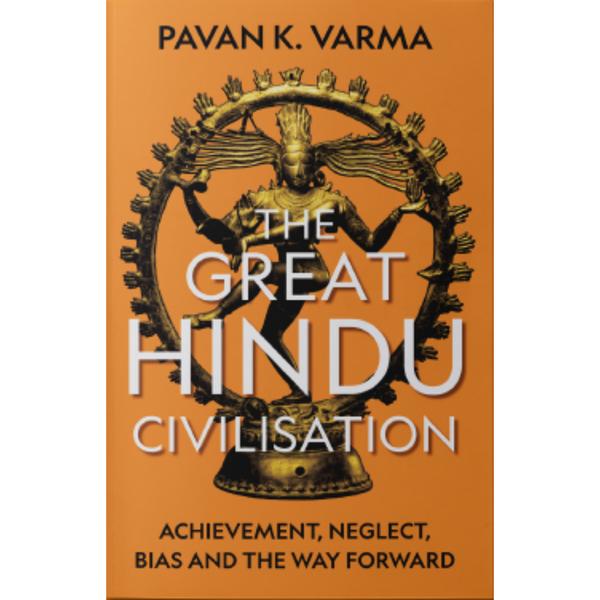Pavan rightly takes Babington Macaulay to task, who knew nothing about India’s culture, the spiritual dimensions or its past.
The Indian Foreign Service has produced a number of authors. The most prominent among them is Pavan Verma. He joined the IFS in 1976. Retired in 2012. His father was an ICS officer.
His first book, “Ghalib: The Man. The Times” was published in 1989. I reviewed his “Krishna. The Playful Divine” and “The Great Indian Middle Class”. Each one of his dozen books has sold well. His writings have elegance, style. He avoids panache. I hold the view that authorship is a sacred calling. No room for sultry flippancy in his writings. To put it briefly, Pavan Verma is an author of high literary voltage.
I have recently read his latest book, “The Great Hindu Civilisation: Achievement, Neglect, Bias And The Way Forward”. It is the work of an accomplished scholar. Reading it at times I felt like an ignoramus.
I learnt much from the book, unusual for a man in his 93rd year. One could say of Pavan’s “The Great Hindu Civilisation”, “har sans main kahani hai, har sans me afsana hai”.
The six chapters are headed. 1. Hindu Civilisation: Myth or Reality? 2. The Audacity of thought (this reminded me of the title of Barak Obama’s book, “An Audacity of Hope”). 3. The Realm of Ideas. 4. The Islamic conquest. 5. British rule And Its Aftermath. 6. The Challenge of the Modern Republic.
Pavan is critical of Amartya Sen’s views on many aspects of Hinduism. He is only a little less severe on Sunil Khilnani and Romila Thapar.
Here I shall address myself to Chapters four and five. How did we become enslaved for nearly a thousand years, after the spiritual achievements of the earlier two millenniums?
“The conquest of India by foreigners starting with the seventeen invasions of Mahmud Ghazni and the subsequent establishment of the Ghurid empire in Delhi under Mohammad Ghori in 1202, left India physically destroyed and psychologically traumatized. Hindu Civilisation had never seen conquerors like the Islamic Turkic invaders, who were so blindly committed to the destruction of a culture, so fanatically driven by a belief in the superiority of their religion, so unrelenting in their hatred for to it and so passionate about the need to convert the unbelievers… The invaders believed that they were the chosen ones, the believers, and that those who were not were Kafirs, unbelievers, beyond the pale. The territory of the Kafir was dubbed Dar-al-Harb, a place to make it Dar-al-Islam, the land of Islam.,” writes Pavan.
Amartya Sen has written in one of his books that, “the slash and burn culture of the Muslim invaders…devastated several cities and ruined many temples, including particularly ones in Mathura, Kanauj and Somnath”.
According to Maulana Minhaj-us-Siraj, Mahmud took away the idol from Somnath and had it broken in four parts, one of these was interred at the entrance of the main mosque in Ghazni and another at the gateways of the Sultan’s palace.
The author concedes that “Hindu and Muslim cultures enriched each other in music, poetry, architecture, painting, food, social behavior, customs and even religious practices. This is the foundation of the Ganga-Jamuni tehzeeb we speak today, which also makes India unique.”
Pavan Verma deals with Sufism deftly and brilliantly with the poets and saints in different parts of India that kept Hinduism alive. Shivaji and Guru Gobind Singh are given their due for not only challenging the Islamic rulers but weakening the Mughal Empire. Tulsidas and Kabir get pride of place, as does Jayadeva for his erotic Gita Gobind, and Mirabai of course.
The opening sentence of the chapter on British rule is, “The establishment of British rule in India deeply impacted Hindu Civilisation and India as a whole, not only for the physical subjugation of its people and the humiliation it entailed, but for the colonization of the mind it achieved. While this is the goal of all colonizing powers, the British were far more successful practitioners of this policy.”
Pavan rightly takes Babington Macaulay to task, who knew nothing about India’s culture, the spiritual dimensions or its past. His deeply offensive, “Minute on Education” “In one rhetorical flourish, rubbished the entire Civilisation heritage of all Indians.”
Pavan Verma’s delineation the characters Raja Ram Mohan Roy came as a surprise.
This is a book of very high scholarship and immensely educative.

